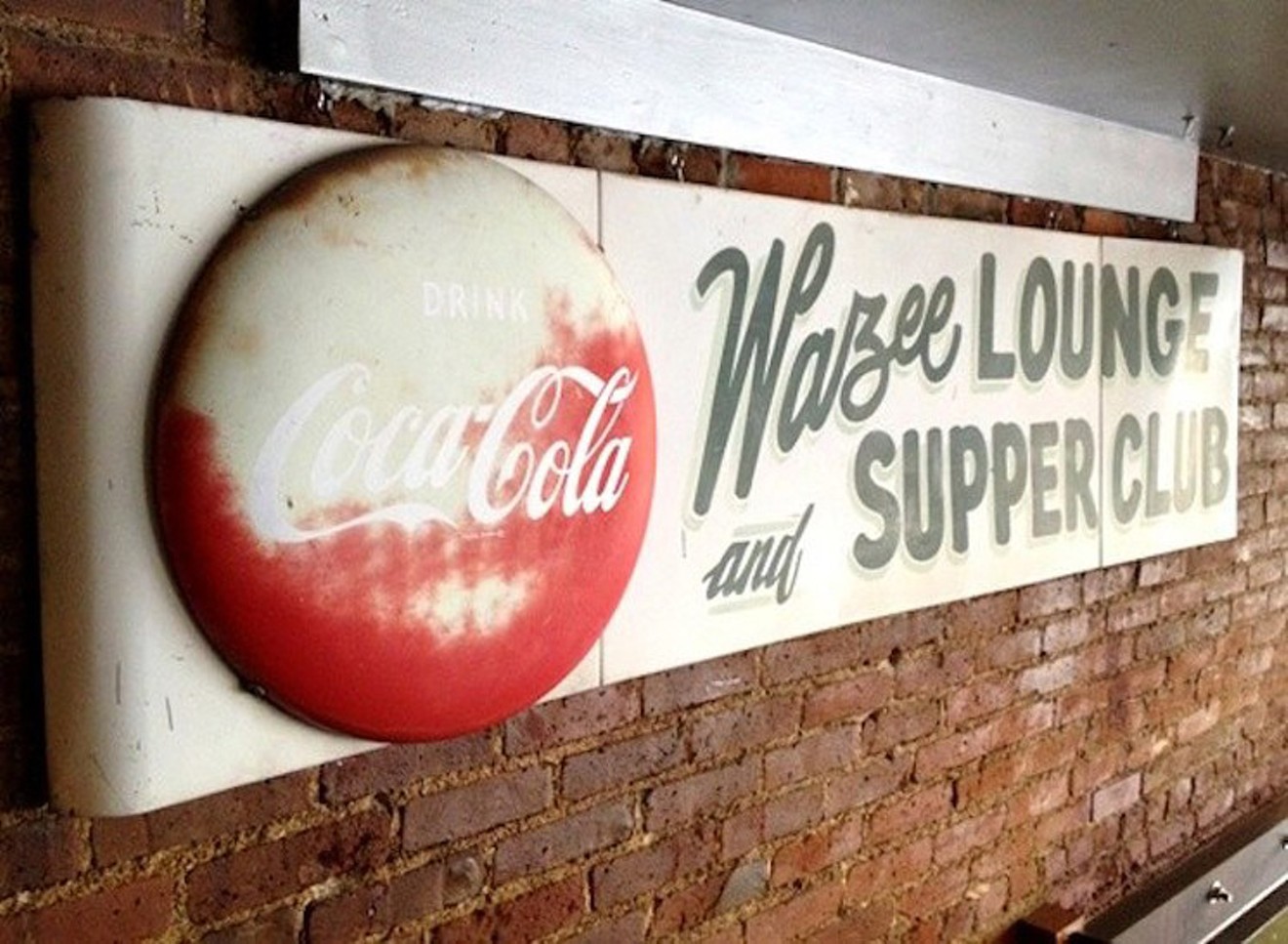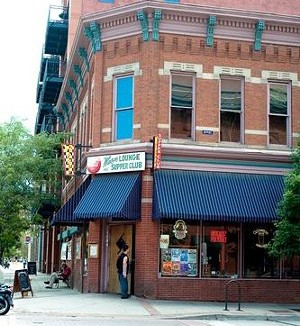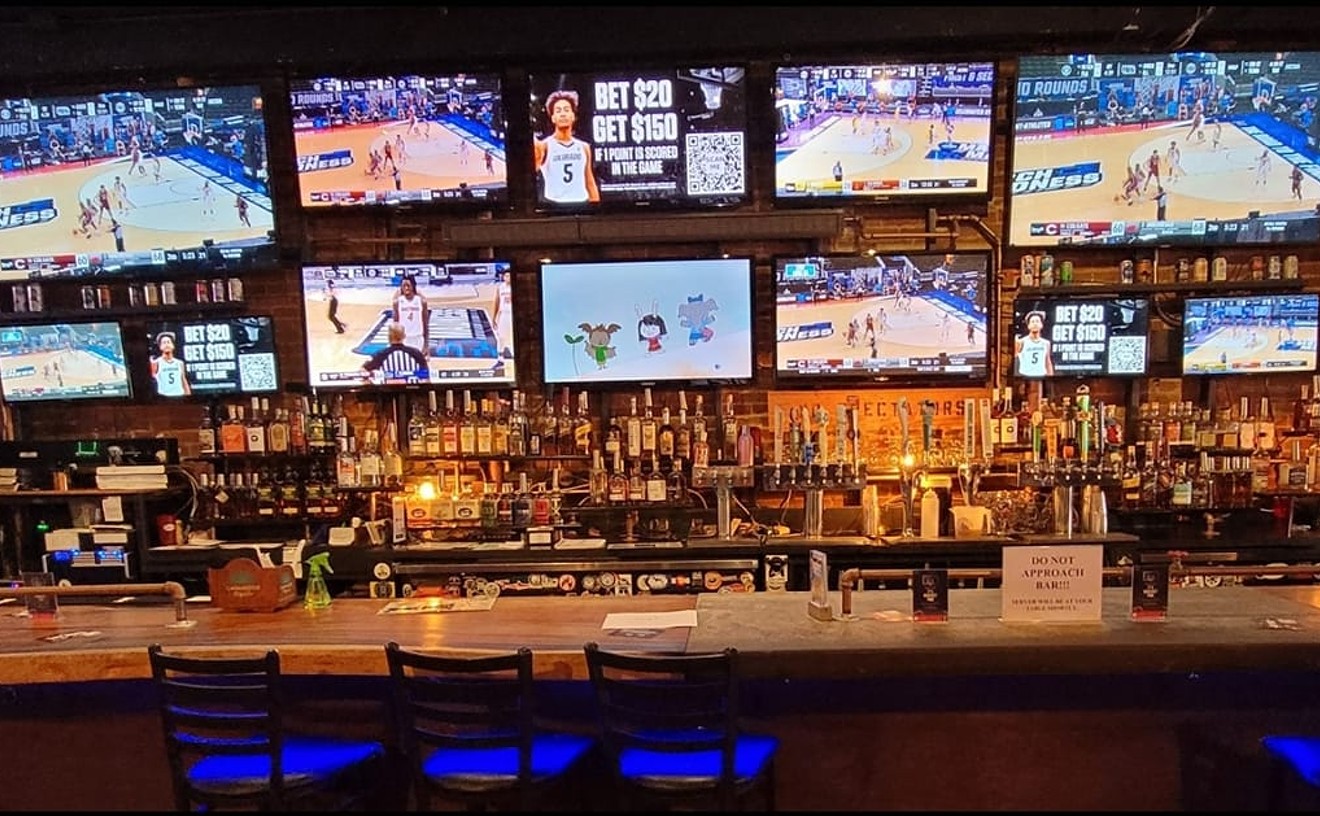A river of booze runs through the history of this city. In fact, a whiskey barrel made the future city possible, according to historian Tom Noel, who wrote his Ph.D. thesis on the watering holes of Denver, creating his first book, The City and the Saloon, and earning the title “Dr. Colorado.” After the discovery of gold by the foothills of the Rockies, competing camps sprang up near the confluence of Cherry Creek and the South Platte River; Denver City was founded on the St. Charles Town claim. On November 22, 1858, General William Larimer — who’d built the town’s first house out of coffin tops, or so the story goes — and his supporters “persuaded” a St. Charles Town Co. representative with a barrel of whiskey (and the threat of a hanging) to surrender his claim. The St. Charles Town rep agreed, and Denver was born.
Larimer Street was the rowdy heart of the early town, where the first city government was founded in a saloon called Apollo Hall, just up from Cherry Creek at 1425 Larimer. One of the first laws enacted by that new government banned the sale of liquor on the street or from wagons and tents...a prohibition that continues to this day (except in the case of special-event permits, which are common in modern-day Larimer Square, still a destination for those seeking food, drink and general merriment). Much of the business of the new city was conducted in saloons, a practice that also continues (unofficially, at least) to this day.
Westword’s first office was a block away from Larimer Square, on the 1400 block of Market Street, in an old brothel above what today is a bar. It wasn’t there in 1977, though, so we frequented the watering holes along Larimer and Wazee streets, including the Terminal Bar at 17th and Wazee, which Tom Waits captured in his song “Nighthawk Postcards” for 1975’s Nighthawks at the Diner. The down-and-dirty Terminal — no relation to the shiny new Union Station Terminal Bar, just a block and a world away — had three happy hours a day to accommodate the shifts at the rail yards and nearby Terminal Annex postal facility. (The Terminal’s longtime owner, Nancy Archer, passed away last month; for the past twenty years, the building has housed a Jax Fish House.)
But our favorite hangout was the Wazee Lounge and Supper Club, at 15th and Wazee streets, a hub in the gritty warehouse district of lower downtown long before it was nicknamed LoDo. We held our meetings there, celebrated big events there, watched as one writer’s car was booted for outstanding tickets that totaled more than the car was worth. We liked the Wazee so much that we moved our office above it in 1980 (at $600 a month!), in the process gaining one of the most affable, understanding landlords ever, the late Angelo Karagas.
Angelo and his brother, Jim, had moved to Denver from Detroit, purchasing another building at 15th and Platte streets that had held a saloon without a break (except for Prohibition, when it sold sodas) since the 1870s; at one point, it had been a hangout for Neal Cassady, who inspired Jack Kerouac to write On the Road. Back then, it was known as Paul’s Place; in 1970, it became My Brother’s Bar because, as Jim Karagas explained it, whenever a bill collector came in and asked who owned the joint, whoever was in charge that day would say, “It’s my brother’s bar.” (Today it belongs to the Newman family, who purchased it last spring from the Karagas family; Peggy Newman had gotten her start there as a waitress more than three decades earlier...back when Westword’s third office was across the street on Platte.)
While Jim Karagas focused on My Brother’s, Angelo oversaw the Wazee, a bar in the shadow of the shaky 15th Street viaduct that the brothers had bought in 1974. Angelo would seat guests and remind tenants (i.e., us) that they were not supposed to use the back staircase to sneak into the bar to grab a pitcher of beer. That staircase came in handy at other times, too, including election day in early May 1983, when a blizzard shut off power in the building and much of downtown, and the street entrance to our office was blocked by snow. That snow also kept many people from the polls — and inspired others to vote against incumbent mayor Bill McNichols, who didn’t seem able to keep the roads clear. We huddled in the bar while waiting to learn that a 36-year-old upstart, Federico Peña, had made the runoff.
The viaduct that once ran right outside of my office window is no longer there, nor is the back staircase into the Wazee. It disappeared during one of several renovations after Angelo passed away and the building was sold, first to a partnership of developer Charley Woolley and the Wynkoop group, when one of the founders of Denver’s first brewpub was still in charge of the company. Today, John Hickenlooper is the governor of Colorado and no longer has an interest in saloons — not financial, at least. But back in the early ’90s, when Westword’s fourth office was across the street from the Wynkoop Brewing Company, we had bar-side seats from which we watched the start of Hickenlooper’s political career, as he fought to save the name of Mile High Stadium.
Yes, a river of booze runs through the history of this city.
And soon the Wazee itself will be history. In December, the Shipp brothers, whose Roadhouse Hospitality had bought the Wynkoop group’s portion in 2015, sold their share to Juan Padro, who owns Bar Dough, Señor Bear and the Tap & Burger concepts. After a major renovation of the building, it will become Morin, a French restaurant. So one day soon, the Wazee will pour its last beer, serve its last pizza, and close another chapter of Denver history. “My hope is that we can really push people to get in to experience the Wazee one last time,” Padro told us when the deal was done. “It’s an important piece of Denver’s history, and we want to honor that and respect that. It’s time for a change, but that doesn’t change the historical significance of the space.”
Denver’s liquid history is fluid by its very nature, and in all the end-of-an-era talk of the Wazee closing, another chapter has been overlooked: The Karagas brothers were not the first owners of the Wazee Lounge and Supper Club. Yes, the circa 1910 building had initially held a plumbing supply house, an oft-repeated part of the story, but it was another pair of brothers — Al Rotola and brother-in-law James Capillupo — who bought that business and turned the place into the Wazee in the ’50s, after a construction project doomed another bar they owned (the more things change...). Although they were Italian, these brothers did not offer pizza; their emphasis was on comfort food, and they started serving it early in the day, for workers coming off their shifts in dusty lower downtown. A decade and a half later, they sold the Wazee to the Karagas brothers, Greeks who made the place famous for pizza and cheap drinks and hospitality served late into the night.
One day in December, MaryAnn Dezzutti, the daughter Al Rotola, met with Woolley and Padro and a few others (including her son, Dominic Dezzutti, producer and host of Colorado Public Television’s Colorado Inside Out, the weekly roundtable on which I’m a panelist) to swap tales and fill in some gaps in the building’s past. Like almost any gathering at the Wazee, this one was spirited. MaryAnn recalled how she would stop by the Wazee to satisfy a few cravings when she was pregnant with Dominic. She listened to the new owners’ plans for the restaurant and gave them her blessing on the retirement of the Wazee Lounge and Supper Club name...which never did make that much sense when her father chose it, since there wasn't much supper served there, she points out. And after sixty years, she pronounced, “It’s time.”
Time to raise a glass to another chapter of Denver’s liquid history. Businesses may dry up, but the memories still flow.
Originally slated to close at the end of last year, the Wazee may keep serving into February. Watch for updates...and don't miss "Drink Here: The Fifty Denver Bars We Can't Live Without," a project inspired by the last-second save of My Brother's Bar.
[
{
"name": "Air - MediumRectangle - Inline Content - Mobile Display Size",
"component": "12017618",
"insertPoint": "2",
"requiredCountToDisplay": "2"
},{
"name": "Editor Picks",
"component": "17242653",
"insertPoint": "4",
"requiredCountToDisplay": "1"
},{
"name": "Inline Links",
"component": "18838239",
"insertPoint": "8th",
"startingPoint": 8,
"requiredCountToDisplay": "7",
"maxInsertions": 25
},{
"name": "Air - MediumRectangle - Combo - Inline Content",
"component": "17261320",
"insertPoint": "8th",
"startingPoint": 8,
"requiredCountToDisplay": "7",
"maxInsertions": 25
},{
"name": "Inline Links",
"component": "18838239",
"insertPoint": "8th",
"startingPoint": 12,
"requiredCountToDisplay": "11",
"maxInsertions": 25
},{
"name": "Air - Leaderboard Tower - Combo - Inline Content",
"component": "17261321",
"insertPoint": "8th",
"startingPoint": 12,
"requiredCountToDisplay": "11",
"maxInsertions": 25
}
]














